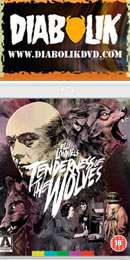
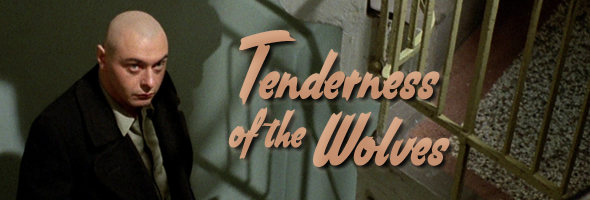
Color, 1973, 82m.
Directed by Ulli Lommel
Starring Kurt Raab, Jeff Roden, Margit Carstensen, Ingrid Caven, Wolfgang Schenck, Brigitte Mira, Rainer Werner Fassbinder
Arrow Films (Blu-ray & DVD) (US/UK R0 HD/NTSC), Anchor Bay (DVD) (US R1 NTSC) / WS (1.78:1) (16:9)
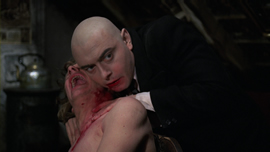
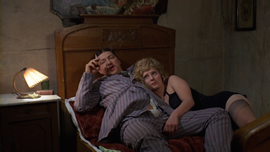 German director Ulli Lommel, a contemporary and semi-protégé of filmmaking legend Rainer Werner Fassbinder both in front of and behind the camera, seemed destined for an odd movie career beginning with this German cult classic, Tenderness of the Wolves (Zärtlichkeit der wölfe). Today Lommel is far better known in America as the director of eccentric horror films like The Boogey Man, BrainWaves, and a slew of cheapie true crime films, so some may be shocked by this austere, darkly funny art film swirled with dark doses of bloodshed and sexuality. Lommel crafted a deliberately paced, often explicit study of madness, boosted by a creepy and memorable performance by Kurt Raab (who also wrote and co-produced the film) in the lead, while the supporting cast is a virtual who's who of Fassbinder's acting stable at the time. Weirdly, almost the entire cast of the classic Ali: Fear Eats the Soul turns up here in one capacity or another a year before that film was even made, and the pair would certainly make for a psychotic double feature about the dangers of conformity.
German director Ulli Lommel, a contemporary and semi-protégé of filmmaking legend Rainer Werner Fassbinder both in front of and behind the camera, seemed destined for an odd movie career beginning with this German cult classic, Tenderness of the Wolves (Zärtlichkeit der wölfe). Today Lommel is far better known in America as the director of eccentric horror films like The Boogey Man, BrainWaves, and a slew of cheapie true crime films, so some may be shocked by this austere, darkly funny art film swirled with dark doses of bloodshed and sexuality. Lommel crafted a deliberately paced, often explicit study of madness, boosted by a creepy and memorable performance by Kurt Raab (who also wrote and co-produced the film) in the lead, while the supporting cast is a virtual who's who of Fassbinder's acting stable at the time. Weirdly, almost the entire cast of the classic Ali: Fear Eats the Soul turns up here in one capacity or another a year before that film was even made, and the pair would certainly make for a psychotic double feature about the dangers of conformity.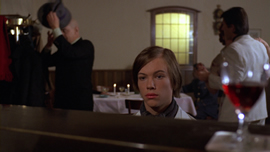 unassuming guy and didn’t even question the strange hacking sounds that went on all night, so Haarman managed to scarf down several dozen young men before he was finally caught and publicly beheaded. The film itself tweaks the story a bit, moving it from the World War I era to the immediate aftermath of World War II (presumably to draw attention to the irony of the locals turning a blind eye to criminal antics around them) and avoiding a depiction of the maniac's fate, instead painting a dark portrait of a neighborhood where everyone should know exactly what's
unassuming guy and didn’t even question the strange hacking sounds that went on all night, so Haarman managed to scarf down several dozen young men before he was finally caught and publicly beheaded. The film itself tweaks the story a bit, moving it from the World War I era to the immediate aftermath of World War II (presumably to draw attention to the irony of the locals turning a blind eye to criminal antics around them) and avoiding a depiction of the maniac's fate, instead painting a dark portrait of a neighborhood where everyone should know exactly what's 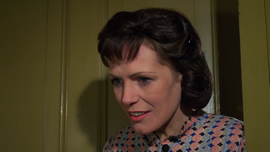 going on but remains too self-absorbed to lift a finger.
going on but remains too self-absorbed to lift a finger. 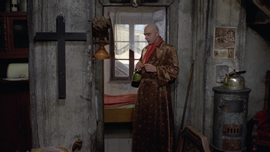
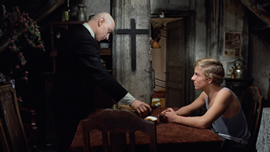 Rainer Werner Fassbinder Foundation looks excellent; anyone who's seen their work through several Criterion releases shouldn't be surprised to find that it looks pretty much perfect from start to finish. The LPCM German audio also sounds excellent, thankfully this time augmented with removable English subtitles, and the old commentary has been swapped out this time for a new track by Lommel and German journalist Uwe Huber, recorded at Fassbinder's former apartment. It covers much of the same ground but makes for an excellent overview of the film with little anecdotes about the careers and side projects of virtually every actor who walks across the screen, plus plenty of social and historical context for his interpretation of the real-life atrocities. Lommel also contributes a very brief optional video intro to the feature and appears for a new video featurette, "The Tender Wolf," which gives him 25
Rainer Werner Fassbinder Foundation looks excellent; anyone who's seen their work through several Criterion releases shouldn't be surprised to find that it looks pretty much perfect from start to finish. The LPCM German audio also sounds excellent, thankfully this time augmented with removable English subtitles, and the old commentary has been swapped out this time for a new track by Lommel and German journalist Uwe Huber, recorded at Fassbinder's former apartment. It covers much of the same ground but makes for an excellent overview of the film with little anecdotes about the careers and side projects of virtually every actor who walks across the screen, plus plenty of social and historical context for his interpretation of the real-life atrocities. Lommel also contributes a very brief optional video intro to the feature and appears for a new video featurette, "The Tender Wolf," which gives him 25 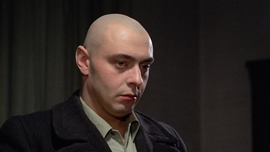 minutes to expound in greater detail on stories including Raab's adverse reaction to having to shave his head, Lommel's dubbing for one character in the film, the pros and cons of shooting in Germany in late autumn, and plenty more including a quick mention of his early role working on Russ Meyer's Fanny Hill. In the 24-minute "Photographing Fritz," director of photography Jürgen Jürges talks (in German with English subtitles) about getting an early big break with this film after reading the script, which led to him working with directors including Fassbinder, Wim Wenders, and most notably Michael Haneke, for whom he shot several major titles. The piece is chock full of fun trivia, such as Fassbinder's tendency to say nasty remarks to Raab before a scene would start to throw him off balance and one incident that led to cops being called to the set. In the 16-minute "Love Bitten: Haarmann s Victim Talks," actor Rainer Will recalls life as a 17-year-old aspiring actor whose theater job with Fassbinder got him a debut role in this film with three additional Fassbinder roles in his future. His Raab stories about the hard-drinking and spiritually conflicted Raab are the highlight here, and he paints a vivid portrait of the jokey, sometimes malicious nature of film shoots at the time, ranging from the delight at him having to cut his long hair for the period location of the film or having to do his own body makeup for his big postmortem scene. The reliably insightful Stephen Thrower provides the longest extra with a 41-minute overview of the background of both the film itself and Lommel's bizarre career, while also placing it in context with gay-themed horror and art films of the decade and explaining how it managed to score an unlikely uncut release in the UK. Definitely a massive upgrade in every respect.
minutes to expound in greater detail on stories including Raab's adverse reaction to having to shave his head, Lommel's dubbing for one character in the film, the pros and cons of shooting in Germany in late autumn, and plenty more including a quick mention of his early role working on Russ Meyer's Fanny Hill. In the 24-minute "Photographing Fritz," director of photography Jürgen Jürges talks (in German with English subtitles) about getting an early big break with this film after reading the script, which led to him working with directors including Fassbinder, Wim Wenders, and most notably Michael Haneke, for whom he shot several major titles. The piece is chock full of fun trivia, such as Fassbinder's tendency to say nasty remarks to Raab before a scene would start to throw him off balance and one incident that led to cops being called to the set. In the 16-minute "Love Bitten: Haarmann s Victim Talks," actor Rainer Will recalls life as a 17-year-old aspiring actor whose theater job with Fassbinder got him a debut role in this film with three additional Fassbinder roles in his future. His Raab stories about the hard-drinking and spiritually conflicted Raab are the highlight here, and he paints a vivid portrait of the jokey, sometimes malicious nature of film shoots at the time, ranging from the delight at him having to cut his long hair for the period location of the film or having to do his own body makeup for his big postmortem scene. The reliably insightful Stephen Thrower provides the longest extra with a 41-minute overview of the background of both the film itself and Lommel's bizarre career, while also placing it in context with gay-themed horror and art films of the decade and explaining how it managed to score an unlikely uncut release in the UK. Definitely a massive upgrade in every respect.